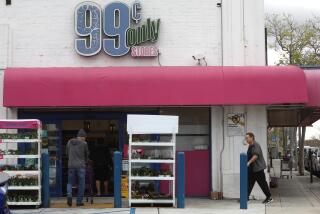Groupon faces growing doubts about its credibility and viability
- Share via
Five months after going public with much fanfare, daily deals site Groupon Inc. is facing fresh doubts on several fronts concerning its credibility and long-term viability.
Despite initial consumer frenzy over its business model that zaps coupon bargains straight to email boxes, the 3-year-old company has been bedeviled by competition, a lack of profit, questions over its accounting practices and a plunging stock price.
Doubts over the operation were heightened last week, when Chicago-based Groupon unexpectedly revised its financial results for the fourth quarter, saying it had overstated its fourth-quarter revenue by $14.3 million. That put its actual loss for the quarter at $65.4 million.
The company blamed the revisions on increased customer returns that it did not anticipate, but one investor filed a lawsuit in federal court, seeking class-action status and accusing Groupon of making false and misleading statements about its financials.
Potentially far more serious is a report, attributed by the Wall Street Journal to unnamed sources, that the Securities and Exchange Commission is investigating the company.
Groupon shares, which closed on its first day of trading at $26.11 (up 31% from its initial public offering price), eventually soared to a high of $31.14. But the stock closed Thursday at $14.18. Markets were closed Friday.
The question is: Can Groupon bounce back?
“The jury is still out on the long-term sustainability of the daily deals industry,” said Herman Leung, an analyst at Susquehanna Financial Group. “There is a daily deals fatigue in the marketplace right now.”
The company, which partners with businesses and takes a cut of each coupon it sells, makes a slim profit on deals such as $10 coupons for $20 Italian dinners.
There are concerns that those partnerships with local merchants will continue in large numbers, Leung said. Many merchants have already been burned by customers who use daily deal coupons for discounted goods or services and never return to buy items at full price.
“The rate for the same customer to come back without a Groupon right now is only 1 in 5,” Leung said. “If merchants don’t fix the model and drive better consumers then they have a definite issue to worry about.”
Groupon declined to make executives available for interviews. In a statement, the company’s chief financial officer, Jason Child, said, “We remain confident in the fundamentals of our business.”
A major effort by Groupon to not only grow but also differentiate itself from competitors was to venture into much higher-priced offerings — such as laser eye treatments for more than $2,000 — than its usual restaurant or spa treatment deals.
But that effort got the company into hot water. In its filing with the Securities and Exchange Commission that revised revenue, Groupon said it had underestimated the rate at which customers would return such high-end deals. To that end, the company blamed “a material weakness” in its internal controls.
Jordan Rohan, an analyst with Stifel Nicolaus, said that the higher rate of returns may signal that Groupon will have trouble cracking the luxury goods and services market.
“The company just told investors that expanding into more complex and more expensive offers is difficult,” Rohan wrote in a note to investors. “Essentially, more consumers were dissatisfied with big ticket purchases than would have been dissatisfied with a discounted burrito or massage.”
If the company is ultimately unable to persuade shoppers to buy luxury cruises or four-star restaurant dinners, Rohan said, that could be a problem “bigger than an accounting or trust issue.”
Other industry watchers were more optimistic.
Jeffrey Houston, a technology analyst with Barrington Research Associates, said Groupon’s high profile meant that any misstep, no matter how small, became news.
“In the short term, there is a huge headline risk, and any time bad news comes out, the stock will go down,” Houston said.
Last week’s restating of revenue by Groupon was hardly its first accounting error to come to light. Last summer, the company was forced to tweak its accounting methods after facing criticism that it was inflating profits by excluding marketing costs, customer acquisition costs and stock-based compensation.
Then, in the run-up to its IPO, Groupon was forced to restate its financials after facing scrutiny over an error that counted fees paid to merchants as revenue.
Still, Houston believes Groupon’s fundamental business model is sound.
“Longer term, it’s really created a new way for small businesses to connect with consumers,” Houston said.
He said the company has established a solid base of subscribers and will be able to cut back marketing expenses that stifle profit.
“Now it’s able to pull back dramatically on marketing spend, and just focus on converting subscribers and repeat customers, which is much less expensive than blasting out ads and getting new customers,” Houston said.
Industry watchers say that Groupon went public without ironing out its business model. But in the long term, many — including Rohan — predicted that the company would fix its mistakes and mature into a profitable company.
“The company is likely to find its groove at some point,” Rohan said.
More to Read
Inside the business of entertainment
The Wide Shot brings you news, analysis and insights on everything from streaming wars to production — and what it all means for the future.
You may occasionally receive promotional content from the Los Angeles Times.











